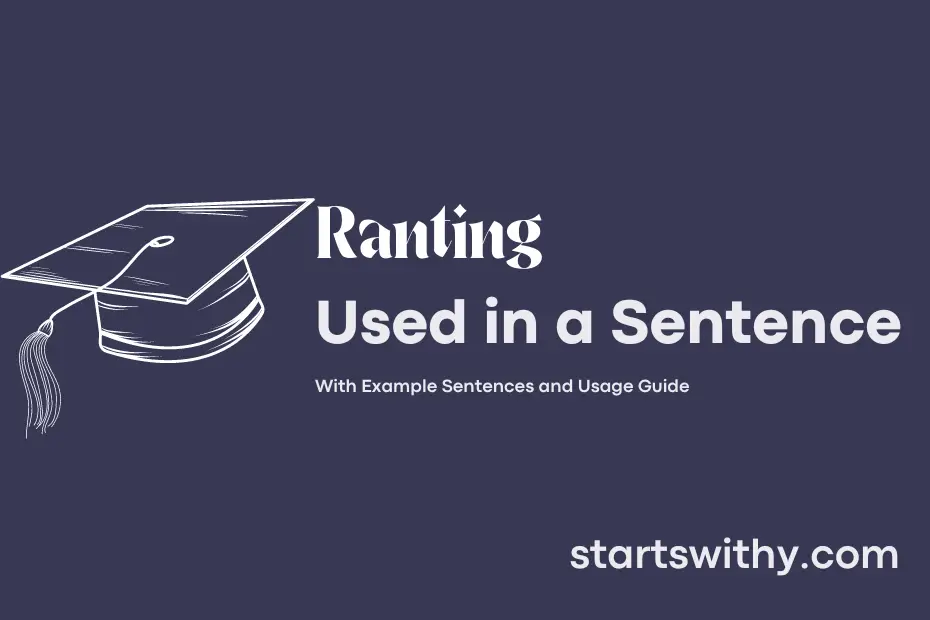Have you ever found yourself in a conversation where someone just won’t stop ranting? Ranting is the act of speaking or complaining at length in an angry, impassioned way about something that bothers you.
It’s common to encounter ranting in various settings, whether it’s online forums, social media, or even in everyday conversations. Ranting can be a way for individuals to express their frustrations, opinions, or grievances about a particular topic.
7 Examples Of Ranting Used In a Sentence For Kids
- Ranting means talking loudly and angrily for a long time.
- Sometimes people feel better after ranting about their problems.
- It’s important to listen to others without interrupting when they are ranting.
- It’s okay to feel mad, but remember to rant respectfully.
- When someone is ranting, it’s important to be patient and understanding.
- You can share your feelings without ranting by using kind words.
- If you need to rant, talk to a trusted adult who can help you feel better.
14 Sentences with Ranting Examples
- Ranting about the quality of food in the college mess has become a daily routine.
- The professor went on a long ranting spree about students being careless with their assignments.
- Ranting to friends about the never-ending assignments and exams.
- The struggle of finding good Wi-Fi to attend online classes has everyone ranting.
- Ranting about the lack of study spaces and overcrowded libraries during exam season.
- Ranting to the administration about the constant electricity cuts on campus.
- The unbearable noise from construction work near the hostel had everyone ranting.
- Ranting about the unrealistic expectations of some professors when it comes to grades.
- Roommates often find themselves ranting about each other’s messy habits.
- The long queues at the photocopy centre have students ranting before every exam.
- Ranting about the never-ending wait for results and answer keys to be published.
- The high cost of textbooks and study materials have students ranting about their expenses.
- Group projects always lead to some ranting about unequal work distribution.
- Ranting about the lack of social events and activities on campus for students to unwind.
How To Use Ranting in Sentences?
Ranting can be an effective tool for expressing strong emotions or frustrations in a coherent and compelling way. When ranting, it is important to remember a few key points:
-
Ranting is most effective when you have a clear and specific point you want to make. Avoid ranting without a purpose, as it can come across as aimless venting.
-
Use descriptive language to convey your emotions effectively. This can help others understand your perspective and empathize with your feelings.
-
Be mindful of your audience. While ranting can be cathartic, it’s important to consider how your words may impact those around you. Avoid using offensive language or personal attacks.
-
Try to keep your rant focused and concise. Long-winded rants can lose their impact and may be difficult for others to follow.
-
Finally, remember that ranting is a form of self-expression and can be a healthy way to release pent-up emotions. However, if you find yourself ranting frequently or in a way that is harmful to yourself or others, it may be helpful to seek support from a therapist or counselor.
By keeping these tips in mind, you can effectively use ranting to convey your thoughts and feelings in a productive and meaningful way.
Conclusion
In summary, sentences containing the keyword “ranting” often express strong opinions or criticisms in an emotionally charged manner. These sentences are characterized by passionate outbursts or tirades, which may reflect frustration, anger, or intense disapproval about a particular subject. Typically, ranting sentences serve to vent sentiments or viewpoints forcefully, often without much regard for restraint or moderation.
These sentences with “ranting” underscore the speaker’s fervent feelings and can convey a sense of urgency or indignation. By using exaggerated language and emotive tone, they aim to emphasize a message or persuade others to share the speaker’s viewpoint. Overall, sentences with “ranting” effectively communicate strong emotions and passionate convictions, making them impactful tools for expressing deeply held beliefs or frustrations.



